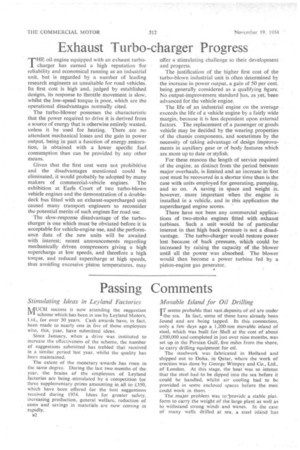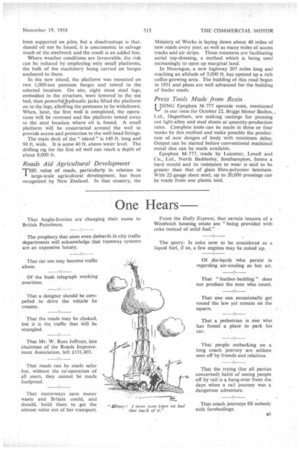Passing Comments
Page 36

Page 37

If you've noticed an error in this article please click here to report it so we can fix it.
Stimulating Ideas in Leyland Factories
imucH success is now attending the suggestion Iv' scheme which has.been in use by Leyland Motors, Ltd., for over 30 years. Cash awards have, in fact, been made to nearly one in five of those employees who, this, year, have submitted ideas.
Since January, when a drive was instituted to increase the effectiveness of the scheme, the number of suggestions submitted has trebled that received in a similar period 'last year, whilst the quality has been maintained.
The extent of the monetary -awards has risen in the same degree. During the last two months of the, year, the brains of the employees of Leyland factories are being. stimulated by a competition for three supplementary prizes amounting in all to £350, which have been offered for the best suggestions received during 1954. Ideas for greater safety, increasing production, general welfare, reduction of costs and savings in materials are now coming in rapidly.
B2
Movable Island for Oil Drilling
:IT seems probable that vast deposits of-oil are under I the sea. In fact, some of these have already been found and are being tapped. In this connection, only a few days ago a .1,200-ton movable island of steel, which was built for Shell at the cost of about £500,000 and completed in just over nine months, was set up in the Persian Gulf, five miles from the shore, to carry drilling equipment for oil.
The steelwork was fabricated in Holland and shipped out to Doha, -in Qatar, where the work of erection was done by George Wimpey and Co., Ltd., of "London. At this stage, the heat was so intense that the steel had to be dipped into the sea before it could be handled, whilst air cooling had to be provided in some enclosed spaces before the men could work in them.
The major problem was to -provide a stable platform to carry the weight of the large plant as well as to withstand strong winds and waves. In the case of many 'wells drilled at sea, a steel island 'has
been supported on piles, but a disadvantage is that, should oil not be found, it is uneconomic to salvage much of the steelwork and the result is an added loss.
Where weather conditions are favourable, the risk can be reduced by employing only small platforms, the bulk of the machinery being carried on barges anchored to them.
In the new island, the platform was mounted on two 1,000-ton pontoon barges and towed to the selected location. On site, eight stout steel legs, embodied in the structure, were lowered to the sea bed, then powerfulibydrautic jacks lifted the platform on to the legs, alloiing the pontoons to be withdrawn. When, later, the first well is completed, the operations will be reversed and the platform towed away to the next location where oil is found. A small platform will be constructed around• the well to provide access and protection to the well-head fittings.
The main deck of the " island " is 140 ft. long and 90 ft. wide. It is some 40 ft. above water level. The drilling rig for the first oil well can reach a depth of about 8,000 ft.
Roads Aid Agricultural Development
THE value of roads, particularly in relation to large-scale agricultural development, has been recognized by New Zealand. In that country, the Ministry of Works is laying down about 40 miles of new roads every year, as well as many miles of access tracks and air strips. These measures are facilitating aerial top-dressing, a method which is being used increasingly to open up marginal land.
In Nicaragua, a new highway 207 miles long and reaching an altitude of 5,000 ft. has opened up a rich coffee-growing area. The building of this road began in 1951 and plans are well advanced for the building of feeder roads.
Press Tools Made from Resin
USING Epophen M-777 epoxide resin, mentioned in our issue for October 22, Briggs Motor Bodies„ Ltd., Dagenham, are making castings for pressing out light-alloy and steel sheets at quantity-production rates, Complete tools can be made in three or four weeks by this method and make possible the production of new designs of body with minimum delay. Output can be started before conventional machined metal dies can be made available.
Epophen M-777, made by Leicester, Lovell and Co.,. Ltd., North Baddesley, Southampton, forms a hard mould and its resistance to wear is said to be greater than that of glass fibre-polyester laminate. With 22-gauge sheet steel, up to 20,000 pressings can be made from one plastic tool. •




































































































